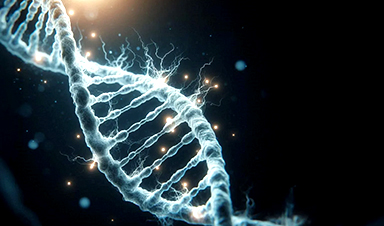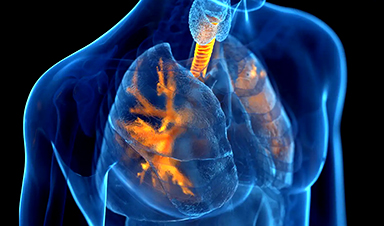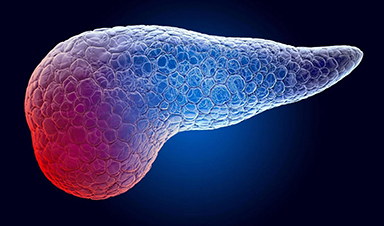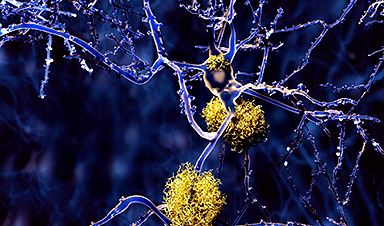Neuronal Molecule Makes Prostate Cancer More Aggressive
Researchers discover a potential therapeutic avenue against an aggressive form of prostate cancer.
Prostate cancer is the second most common cancer and the second leading cause of cancer death among American men. Now, researchers have discovered key molecular players that drive prostate cancer to progress into a highly aggressive form of the disease called neuroendocrine prostate cancer that currently has no effective treatment. The finding uncovers new avenues to explore for therapeutics to treat neuroendocrine prostate cancer.
“We have found novel pathways that promote neuroendocrine prostate cancer,” says senior author Lucia R. Languino, PhD, a professor in the department of Pharmacology, Physiology and Cancer Biology and director of the Genetics, Genomics, and Cancer Biology PhD Program at Thomas Jefferson University. She and her team published the new research in the journal Scientific Reports.
Adenocarcinoma prostate cancers can progress into neuroendocrine prostate cancer. Until now, how this transition occurs has been a mystery.
To better understand how neuroendocrine prostate cancer develops, Dr. Languino and colleagues looked for biomarkers of the disease. In previous work, they discovered that a molecule known as aVb3 integrin is abundant in mice and humans with neuroendocrine prostate cancer, but missing in prostate adenocarcinoma.
To look for molecules unique to neuroendocrine prostate cancer, the researchers found that aVb3 integrin expression in prostate cancer cells bumped up the expression of a known marker of neuroendocrine prostate cancer and significantly increased the expression of a molecule called Nogo receptor 2 (NgR2).
The finding “was a big discovery,” Dr. Languino says, who is also a researcher with the Sidney Kimmel Cancer Center – Jefferson Health. That’s because NgR2 is a protein found in nerve cells, where it contributes to neuronal functions. It has never before been studied in cancer, of any kind.
Dr. Languino and her colleagues wanted to find out what this molecule, a neuronal protein, is doing in cancer.
An initial experiment revealed that NgR2 binds the aVb3 integrin. The scientists also saw that in mice with neuroendocrine prostate tumors, aVb3 integrin and NgR2 were both present in the primary tumor and in cancerous lesions that had formed in the lungs of the animals. A follow-up experiment made it clear that both aVb3 integrin and NgR2 are necessary for neuroendocrine prostate cancers.
When Dr. Languino and her team lowered the amount of NgR2 in neuroendocrine prostate cancer cells, neuroendocrine markers also decreased. The results suggest that NgR2 plays a role in the development of neuroendocrine prostate cancer. Lowering the amount of NgR2 also reduced the ability of cancer cells to grow and move, indicating that NgR2 may have a hand in cancer spreading to other parts of the body, in a process known as metastasis. Metastases are often what make cancers fatal.
“These two molecules, aVb3 integrin and NgR2, seem to create a combination that is lethal,” Dr. Languino says.
She and her colleagues are now looking for a molecule or antibody that would block the effect of NgR2, or the aVb3 integrin/NgR2 complex, to inhibit their ability to promote neuroendocrine prostate cancer growth and development, and make the cancer more susceptible to therapy.
News
Baffling Scientists for Centuries: New Study Unravels Mystery of Static Electricity
ISTA physicists demonstrate that contact electrification depends on the contact history of materials. For centuries, static electricity has intrigued and perplexed scientists. Now, researchers from the Waitukaitis group at the Institute of Science and [...]
Tumor “Stickiness” – Scientists Develop Potential New Way To Predict Cancer’s Spread
UC San Diego researchers have developed a device that predicts breast cancer aggressiveness by measuring tumor cell adhesion. Weakly adherent cells indicate a higher risk of metastasis, especially in early-stage DCIS. This innovation could [...]
Scientists Just Watched Atoms Move for the First Time Using AI
Scientists have developed a groundbreaking AI-driven technique that reveals the hidden movements of nanoparticles, essential in materials science, pharmaceuticals, and electronics. By integrating artificial intelligence with electron microscopy, researchers can now visualize atomic-level changes that were [...]
Scientists Sound Alarm: “Safe” Antibiotic Has Led to an Almost Untreatable Superbug
A recent study reveals that an antibiotic used for liver disease patients may increase their risk of contracting a dangerous superbug. An international team of researchers has discovered that rifaximin, a commonly prescribed antibiotic [...]
Scientists Discover Natural Compound That Stops Cancer Progression
A discovery led by OHSU was made possible by years of study conducted by University of Portland undergraduates. Scientists have discovered a natural compound that can halt a key process involved in the progression [...]
Scientists Just Discovered an RNA That Repairs DNA Damage – And It’s a Game-Changer
Our DNA is constantly under threat — from cell division errors to external factors like sunlight and smoking. Fortunately, cells have intricate repair mechanisms to counteract this damage. Scientists have uncovered a surprising role played by [...]
What Scientists Just Discovered About COVID-19’s Hidden Death Toll
COVID-19 didn’t just claim lives directly—it reshaped mortality patterns worldwide. A major international study found that life expectancy plummeted across most of the 24 analyzed countries, with additional deaths from cardiovascular disease, substance abuse, and mental [...]
Self-Propelled Nanoparticles Improve Immunotherapy for Non-Invasive Bladder Cancer
A study led by Pohang University of Science and Technology (POSTECH) and the Institute for Bioengineering of Catalonia (IBEC) in South Korea details the creation of urea-powered nanomotors that enhance immunotherapy for bladder cancer. The nanomotors [...]
Scientists Develop New System That Produces Drinking Water From Thin Air
UT Austin researchers have developed a biodegradable, biomass-based hydrogel that efficiently extracts drinkable water from the air, offering a scalable, sustainable solution for water access in off-grid communities, emergency relief, and agriculture. Discarded food [...]
AI Unveils Hidden Nanoparticles – A Breakthrough in Early Disease Detection
Deep Nanometry (DNM) is an innovative technique combining high-speed optical detection with AI-driven noise reduction, allowing researchers to find rare nanoparticles like extracellular vesicles (EVs). Since EVs play a role in disease detection, DNM [...]
Inhalable nanoparticles could help treat chronic lung disease
Nanoparticles designed to release antibiotics deep inside the lungs reduced inflammation and improved lung function in mice with symptoms of chronic obstructive pulmonary disease By Grace Wade Delivering medication to the lungs with inhalable nanoparticles [...]
New MRI Study Uncovers Hidden Lung Abnormalities in Children With Long COVID
Long COVID is more than just lingering symptoms—it may have a hidden biological basis that standard medical tests fail to detect. A groundbreaking study using advanced MRI technology has uncovered significant lung abnormalities in [...]
AI Struggles with Abstract Thought: Study Reveals GPT-4’s Limits
While GPT-4 performs well in structured reasoning tasks, a new study shows that its ability to adapt to variations is weak—suggesting AI still lacks true abstract understanding and flexibility in decision-making. Artificial Intelligence (AI), [...]
Turning Off Nerve Signals: Scientists Develop Promising New Pancreatic Cancer Treatment
Pancreatic cancer reprograms nerve cells to fuel its growth, but blocking these connections can shrink tumors and boost treatment effectiveness. Pancreatic cancer is closely linked to the nervous system, according to researchers from the [...]
New human antibody shows promise for Ebola virus treatment
New research led by scientists at La Jolla Institute for Immunology (LJI) reveals the workings of a human antibody called mAb 3A6, which may prove to be an important component for Ebola virus therapeutics. [...]
Early Alzheimer’s Detection Test – Years Before Symptoms Appear
A new biomarker test can detect early-stage tau protein clumping up to a decade before it appears on brain scans, improving early Alzheimer’s diagnosis. Unlike amyloid-beta, tau neurofibrillary tangles are directly linked to cognitive decline. Years [...]






















